- Home
- Peter Swanson
All the Beautiful Lies Page 3
All the Beautiful Lies Read online
Page 3
“I’m happy for you, Dad. I like Alice.”
His father’s relief was palpable. His shoulders relaxed, and he began to talk about Alice, how much they had in common, having both lost parents when they were young, and how they both felt left behind in this new, modern world.
Harry really did feel okay about his father seeing Alice, but in October, she came down to New York to visit, and her presence in their apartment, the apartment that was still filled with so many of his mother’s things, unnerved him. Alice was giddy, expressing to Harry several times how much it meant to her that he had given his blessing. The first time she said it, she followed up by hugging Harry, even kissing him on his cheek, and whispering “My darling boy” in his ear. The kiss, and the feel of her breath in his ear, caused Harry to involuntarily shudder and tense, and Alice broke the hug, clearly embarrassed. Harry retreated to his bedroom, and tried to forget the awkward moment, but it wasn’t easy. He could feel the softness of her waist in his hands, and the lingering sound of her voice in his ear. It had been nice but awkward at the same time. Down deep, he felt a revulsion that he was sexually attracted to a woman that his father was also attracted to. It felt unnatural, but the more he tried to push the images from his mind, the more they held strong.
Harry was suddenly out on Buxton Point, on the outskirts of the parking lot that surrounded the white lighthouse topped with red, now a historic landmark and Kennewick’s only major tourist attraction. He circled, going around the keeper’s house, and started back toward Kennewick Beach. He’d been walking for well over an hour, the sun now low enough in the sky that it was casting long shadows along the beach. Even so, he made the sudden decision to walk all the way to Kennewick Harbor along the cliff walk. He would have to do it sooner or later, and he needed to see if there was any sign of his father, and what had happened to him, along the path.
Harry stayed on Micmac Road, heading south. Once he’d cleared the beach, Micmac began to curve and twist, with sporadic views out over the bluff toward the ocean. The house lots were wider, the houses bigger, most of them old, but there were new mansions here and there, including one monstrosity that looked more like a hotel than a house.
He had to double back but Harry found the path through the scrubby pine that led to the northern start of the cliff walk. It seemed narrower than he remembered, rose hip and winterberry bushes scraping at his legs, and he wondered if anyone used it anymore. Maybe the path was on private land now, the owners hoping it would be forgotten. Still, it took him out to the cliff walk, with its view along the rocky shore to the half-moon beach of the harbor. This was his father’s usual walk, and the one he ended his life on. Harry walked a quarter mile, slowly, scanning for any sign of where, exactly, his father had fallen. He wondered if there might be police tape at the scene, then dismissed the idea. It wasn’t a crime scene. It had been an accident. He took a break and sat on one of the wooden benches along the path. There was a small metal plaque on the bench saying that it was given in memory of Blanche Audet, who had died in 1981. Harry stared out toward the ocean, and thought of how many times his father must have taken this very walk, and wondered if he’d ever sat on this bench. The view was beautiful, but there was something bleak about staring out to the ocean, as well. All that crushing, grey water that had never changed and never would. Except for the new resort hotel on the far edge of Kennewick Harbor Beach, this view must have looked the same to Blanche Audet, and whoever was here before Blanche, and whoever was here long before this path was carved out of the rock.
Harry’s phone vibrated in his jeans pocket but he ignored it. He stayed on the bench until he was cold, pulling his sweater on, then stayed awhile longer.
When he finally stood, his legs felt stiff. He was out of shape, he realized, having spent all the last semester writing his thesis, crouched over his laptop. He’d stopped swimming, and he hadn’t played squash since before Christmas.
He checked his phone. Several friends from college had texted or called. He put the phone back in his pocket, feeling irrational, unfair anger at their concern. They cared for him, but Harry dreaded the inevitable conversations. He wasn’t always good at talking. Words and sentences filled his brain—he felt as though he was constantly narrating his own life—but bringing those words from inside his brain and out into the world had always been difficult for him. When he was younger he’d suffered from a lateral lisp, his words often coming out with embarrassing hisses. Speech therapy had corrected it, teaching him to let the words flow from the top of his tongue, and not from its sides, but the lisp had done its damage.
He silenced his phone, and decided to finish the remainder of the cliff walk before turning back toward Grey Lady.
He scrambled up a short incline, then ducked to get under a wind-bent tree. It was the highest point of the walk, and one of the narrowest sections of the path. A sharp drop led to a cluster of black rocks, green and slick where the seawater reached during high tide. Waves slapped at the rocks, sending out fans of spray. The path was packed gravel, and slabs of shale. It wasn’t slippery, but it wasn’t completely flat, either. He kept walking, and almost missed the small bouquet bunched together and left leaning against the twisted root of a white pine.
He bent and picked up the bouquet; it was made from bittersweet with its familiar red berries, some still cocooned in yellow, that bloomed in the autumn. These had somehow survived through the winter, the berries shrunken and almost black. They had been bound together loosely by a long strand of grass. Harry looked at the stem ends of the bittersweet; they had been broken, not cut. Whoever had put together this bouquet had done it impulsively, without using clippers or proper string. And had it been meant for his father? Was this the place he had slipped? He’d ask Alice if she knew exactly where he’d fallen. It seemed suddenly important. He’d also ask her if she’d left the bouquet, but he doubted it. He put the bittersweet back where he’d found it, some of the wizened berries popping off the vine as he rested it against the tree.
It was fully dark when he reached the driveway of Grey Lady. He paused, wondering if he could get away with entering the house and going straight to his bedroom. He’d brought some cheap bourbon with him from college and maybe he could drink himself into oblivion, stay that way throughout the next few days. There was a soft glow of light coming from the bay windows, the curtains now drawn.
Instead of walking directly to the front door, Harry cut diagonally across the short front yard and stood in front of the windows. There was a gap between the curtains, and he could see through the living room and into the kitchen, now fully lit, where Alice was moving around. There was a glass of wine on the island, and a cutting board loaded with vegetables, but Harry watched the way Alice was moving, twitching her hips a little as though she was listening to music. She turned and found her glass of wine and took a long sip. Her face was slightly distorted by the window glass, but she looked . . . was it happy? No, not exactly, but she did look peaceful, at ease. Harry watched for a while longer, getting colder, waiting to see if her expression changed. But it didn’t—she continued to move through the kitchen, light on her feet, her lips now moving along to the music Harry couldn’t hear.
Chapter 4
Then
Edith and Jake got married the following summer in the city clerk’s office in Portland, Maine. Alice went, and so did one of Jake’s dull friends from the bank. Afterward, they all drove back toward Kennewick, stopping in Ogunquit to eat a late lunch at a fancy restaurant made almost entirely of glass. It was built on a bluff with a view of a rocky stretch of coast. Edith and Jake pointed out houses they’d like to own if they ever won the lottery. Alice ordered the prime rib because her mom told her she could have anything she wanted.
After the wedding, Edith and Alice moved into Jake’s three-bedroom condominium at the north end of Kennewick Beach, up near the lighthouse. The building, except for its location, was not that impressive on the outside, just a three-story, grey-shingled box segm
ented into four equal condos, each with two parking spaces under the unit. But the condo interior was impressive. Jake had hired an interior decorator, and everything inside was spotless and shiny, with a kitchen full of gadgets and plants. The only thing Alice missed from their rental house was the wooden floors, the way they felt on her bare feet. Here, there was white shag carpeting, spotless because Jake had a cleaning woman who came every week. Also, Jake instituted a no-smoking-in-the-house policy. He smoked his occasional cigarette on the second-floor deck, and he insisted that Edith did as well, even when it was freezing out.
“He doesn’t expect you to clean the house?” Alice asked her mother, when she learned about the cleaning lady.
“No,” Edith said, as though she’d been asked if she was a cannibal. “Of course not. He makes good money, you know.”
Alice wondered what her mother would do with all her spare time now that she didn’t even have a house to take care of. Actually, she didn’t wonder. She knew that she’d drink more. It hadn’t bothered her that much when it was just the two of them, but now it worried her because there was a third person in their family. Did Jake know what his new wife was really like? Would he want a divorce and they’d all have to leave their beautiful-smelling new home?
It turned out that Alice didn’t need to worry. For the first two years of the marriage, Edith spent her mornings doing aerobics in the living room; Jake had a VCR, and Edith had invested in a slew of aerobics tapes. In the afternoons she would plan that night’s dinner, following intricate recipes from cookbooks with French-sounding names. When Alice came home from school, her mother was usually in the kitchen, watching an afternoon talk show on the cabinet-mounted television, preparing ingredients and drinking a red smoothie that Alice knew contained as much vodka as it did strawberries. As soon as Jake walked through the door she would make proper drinks, martinis usually, and a Shirley Temple for Alice, and the televisions would be turned off.
By dinnertime Edith was slurring her words and barely picking at her food. After dinner Alice’s job was to wash the dishes, although Jake usually helped by bringing them to her. Edith took a brandy into the living room. “I just need to relax,” she would always say. She’d turn the television on, and finish the brandy and then she’d be asleep. Jake never seemed to mind. He’d gently slide her down the white leather sectional, then take control of the remote, usually finding a game to watch. If Alice wasn’t doing homework in her room, she’d watch television with him, and he’d sometimes let her pick what she wanted to watch.
But usually Alice stayed in her room. It wasn’t that she didn’t want to watch TV with Jake. She loved television. It was that she couldn’t stand the sight of her mother passed out on the couch, her mouth open, emitting raspy snores. Jake didn’t seem to notice, only occasionally shifting her when the snores got too loud.
One night, after Alice had finished her homework, she came out to the living room. Jake was watching hockey, and Edith was facedown on the couch, a little pool of drool next to her mouth. “Gross,” Alice said before she could stop herself.
Jake laughed. “Your mother likes to drink,” he said, as though that particular thought had just occurred to him.
“Does it bother you?”
“Not too much. People are who they are, don’t you think?”
“I guess so.”
“You finish your homework?” Jake glanced over at the empty recliner, and Alice took her usual seat, accepting the remote control from her stepfather.
“Yeah, I didn’t have too much to do. Just algebra, and some reading.” Alice flipped the channel to CBS. My Sister Sam was on.
“School going all right for you?”
Alice shrugged. “Yeah, it’s fine.”
“You have friends?”
“Gina.”
“Oh, right, Gina.”
Alice turned to look at Jake, still staring at the television, lips pressed together as though he was concentrating on what was happening on the screen. Alice assumed he must be asking these questions only because Edith had asked him to, or because they’d been discussing it together. But discussing what? The fact that Alice seemed to have only one friend at school?
The truth was that Alice hated Kennewick High School and the students who went there. The incident that sparked this hate had happened her freshman year, when she’d met a senior named Scott Morgan because their lockers were next to one another. He was a lacrosse player with a good smile and bad acne on his forehead. When Alice told him she was from Biddeford, he said that his dad owned a car dealership there, and he mentioned a pizza place that Alice knew. Whenever he saw her again at the lockers, he’d always ask, “How’s Biddeford?” as though she still lived there. On the first warm day in April, he told her about a party that was happening on the beach at midnight. It had been easy for Alice to sneak away; she didn’t even need to be quiet, knowing her mom could sleep through pretty much anything. She wore cutoff shorts and a big hoodie, and carried a bottle of Sprite that she’d spiked with some of her mother’s vodka—not because she wanted to drink it, but because you brought alcohol to a party. When she got to the section of beach that Scott had mentioned, Scott was there alone. He handed Alice an open can of beer and said, “I lied about the party.”
“How come?”
“To get you here alone.”
They were on the south end of the public beach, near the playground and a picnic area shaded by pine trees. They walked to the darkest bench and began to kiss, Scott’s hands instantly fumbling under Alice’s hoodie, and pulling at the zipper of her shorts.
“You a virgin?” Scott asked, when he’d gotten Alice’s shorts down around her ankles.
“Yes.”
“My friend told me that all the girls in Biddeford do it in middle school.”
“Well, I didn’t.”
“Do you want to do it now?”
“Sure,” Alice said. It wasn’t something she had planned, but now that it was happening, it seemed like the right thing to do. Clearly, it was what they did in Kennewick, and if she let it happen now, then she wouldn’t need to worry about it later. And Scott was opening up a small plastic packet that looked like a condom, so she wouldn’t have to worry about getting pregnant. Alice reached down to touch him, but he bucked his hips back, saying, “I don’t want to come yet.” But even without being touched he only got about halfway inside of her before he shuddered, his jaw clenching, tendons tensing in his neck.
“Don’t fucking tell anyone, okay?” he said, as he pulled out of her, holding on to the condom.
“Okay. I won’t.”
But on Monday at school, the word WHORE had been written in capital letters with a silver marker across the front of Alice’s locker, and while she was crossing the open walkway to the science building for Period C, a girl that Alice had never noticed before started yelling at her from the smoking pit. “Stay away from Scott, you fucking slut.” She was a blonde with crimped hair. One of the blonde’s friends held her upper arm, restraining her from coming over. Alice kept walking, her heart jackhammering in her chest. Why had Scott told people after telling her not to tell anyone? For the rest of the day she felt like everyone in school was staring at her, and either laughing or judging. She didn’t see Scott once, and assumed that he was avoiding her.
When she did finally see Scott, the following day, he didn’t even look at her, just slammed something into his locker and took off. Alice watched him walk away, still wondering what had happened, when a girl—another friend of the blonde—shoved Alice hard in the shoulder and said, “Don’t even look at him, Bitcheford.” A group of students walking by burst into laughter. For a brief moment Alice almost went after the girl. She imagined grabbing her hair, pulling her hard to the floor, stamping on her neck. But Alice controlled herself; she showed nothing.
It was only at the very end of freshman year that Alice heard the whole story. Gina Bergeron was another freshman whose family had recently moved to Kennewick. She was tall a
nd gangly, and spoke so rapidly that sometimes spit would bubble from her lips. They’d met in science class, where they’d been paired together to dissect a fetal pig. She had two older brothers and two younger sisters, all about a year apart. Alice and Gina became friends almost by default. They were both new to Kennewick, and both friendless, and that was where the similarities ended. Still, it was someone to eat lunch with in the cafeteria.
Gina’s brothers were both athletes; the sophomore was a tennis player, and the junior, Howie, was good at lacrosse. Gina got the story from Howie. There actually had been a party the night that Alice had sex with Scott, but not on Kennewick Beach. It had been down at the Harbor Beach. Scott had skipped out to be with Alice, but when he returned he got drunk and bragged to all his friends how he’d just fucked a freshman girl. His on-off girlfriend, Stacy Homstead, the girl with the crimped hair, heard about it, and she was the one who spread it around school the following day, the story of the slutty freshman from Biddeford who’d steal your boyfriend. The Bitcheford.
“Did you really have sex with him?” Gina asked. They were walking together to Alice’s house, along the sidewalk that bordered the beach.
“Sort of, I guess. It didn’t last very long.”
Gina covered her mouth and laughed, more of a snort.
“What was it like?”
“It was like nothing,” Alice said, and meant it.
“Geez,” Gina said. Alice knew that despite being fascinated, Gina had judged her as well. She also knew that Gina, gawky now, with her giraffe legs and wobbly head, was going to be beautiful by senior year, and that their friendship would not last. She didn’t really care. She’d already resolved to just get through high school on her own. She’d gotten through her whole childhood on her own, after all, without a father or brothers or sisters. She had her mother, who barely counted. Alice felt that she’d been counting down the days to being on her own as an adult for longer than she remembered. She didn’t really need friends, even though Gina and she remained somewhat close throughout all of high school. But Alice’s first prediction did come true. Between junior and senior year, Gina lost her awkwardness and turned into a runway model. It didn’t make her as popular as Alice thought it would, though. The girls seemed to resent her, and the boys were frightened away.

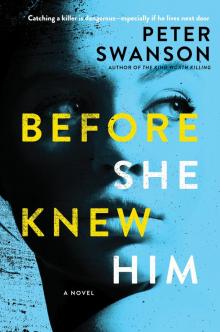 Before She Knew Him
Before She Knew Him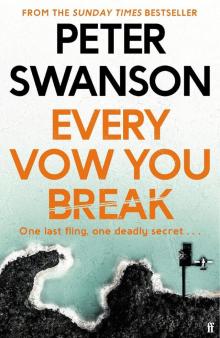 Every Vow You Break
Every Vow You Break Eight Perfect Murders
Eight Perfect Murders Rules for Perfect Murders
Rules for Perfect Murders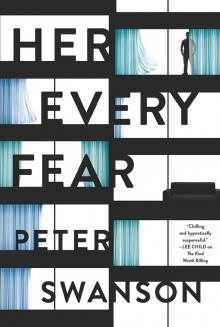 Her Every Fear
Her Every Fear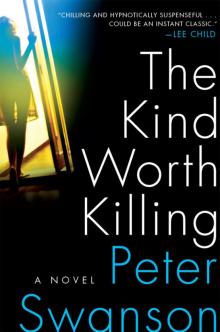 The Kind Worth Killing
The Kind Worth Killing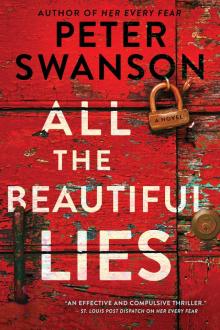 All the Beautiful Lies
All the Beautiful Lies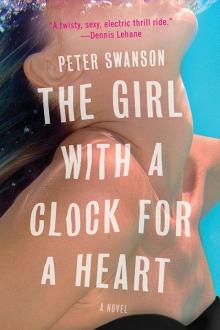 The Girl with a Clock for a Heart: A Novel
The Girl with a Clock for a Heart: A Novel